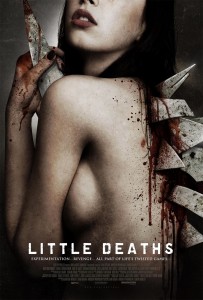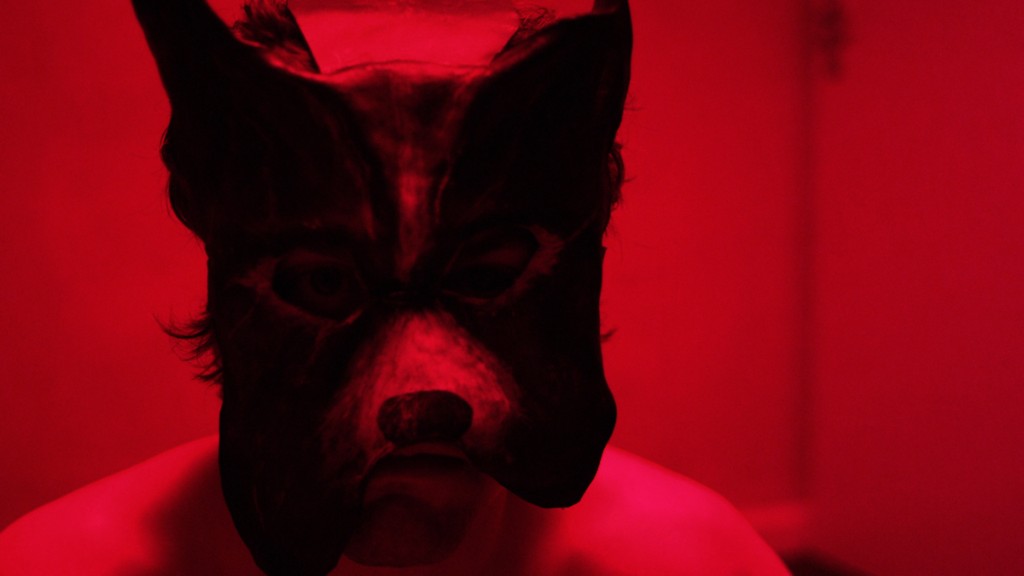LITTLE DEATHS
LITTLE DEATHS: British directors Sean Hogan, Andrew Parkinson and Simon Rumley talk about their disturbing horror anthology
– Kier-La Janisse
————————–
 (the following introduction appeared in an earlier edition of Spectacular Optical)
(the following introduction appeared in an earlier edition of Spectacular Optical)
UK-based horror anthology Little Deaths – a collaboration between independent directors Sean Hogan (Lie Still), Simon Rumley (The Living and the Dead, Red White + Blue) and Andrew Parkinson (Venus Drowning) – is the latest in a resurgence of inspired horror anthologies that includes The Theatre Bizarre, Paris I Kill You and the recently-announced ABCs of Death. Exec-produced by Pierre David – whose genre catalogue runs the gamut from Cronenberg’s Videodrome to Lee Demarbre’s Smash Cut – Little Deaths is a fascinating study of emotional manipulation and various forms of addiction, from drug abuse to co-dependency. Artfully blending get viagra without prescription transgressive ideas and visuals with the low-key realism characteristic of British indies, each segment is a unique aesthetic statement that nonetheless feeds into and off of its cohorts to create an impressively cohesive whole.
Hogan’s biting House and Home opens the film with a bang, focusing on an upper class British couple who pick up street people and take them home in order cheap levitra buy online euro to humiliate and abuse them. In Andrew Parkinson’s Mutant Tool, Jodie Jameson (the award-winning actress for Parkinson’s earlier Venus Drowning) plays an on/off callgirl recovering from a drug habit, whose boyfriend unwittingly signs her up for experimental treatment with a doctor doing unethical experiments in traumatic bonding. The power games that run through all the romantic relationships in this anthology are most overt in Simon Rumley’s Bitch, in which a put-upon office administrator works out her issues by emotionally abusing her partner through a degrading sexual routine.
Spectacular Optical caught up with the three directors to get their thoughts on sex, death, role-playing and bringing some rather disturbing imagery to life on the big screen.
——————
Simon – what inspired your episode, in terms of its relationship dynamics?
Simon: Well, it actually goes back to when I was at viagra online without a prescription University and a spider dropped on my girlfriend at the time, who was naked (we were in bed) and she completely freaked out. I thought ‘hmmmm – that was interesting!’ So at the time I started writing a short story about a goth couple, the guy in which was completely dominated by the woman, but he finds her Achilles heel – a phobia about spiders – and decides to pay her back for all the times she’s humiliated him. I never finished the story, but it stuck with me, and when we first started discussing Little Deaths, it was the first thing that sprang to mind.
Both your episode and Sean’s have a very domineering female component of this relationship – what do you think is happening psychologically with these female characters that make them behave the way they do in their relationships?
Simon: Sounds like a school exam question! Well, I always thought that with Claire she needed a man to be a man and that for her, if the man is aggressive and dominant then she’s be happy because for her, for whatever reason, this was an indication that the man really loved her. So in my mind all the fairly unpleasant things she does to Pete and situations she puts him through are really a cry to him to be more dominant and to prove to her that he really does buy levitra overnight love her. Of course, he’s not that kind of male specimen, so he doesn’t react the way she wants, and things essentially break down in communication, go incredibly awry. I always thought it was ironic that the time he gets most angry with her, in the pub, is the time when she feels the most respect for and attraction to him.
Sean: As lowest propecia price for my segment, Victoria is a predator, plain and simple. She is the type of person that believes in class privileges, in taking what you want, regardless of how that may affect others. I think those kind of people have always been with us, and sometimes they are even abetted by the political climate of the day – sadly, this is something we’re seeing a lot of right now.
And conversely, why does her male partner put up with it?
Simon: Well, flip side of the same coin, really; I think he really loves her but doesn’t understand how to express his love in a way she will comprehend. I think, to a point, he actually enjoys the role-playing and there’s certainly a softness and compliance in him and what he does that suggests this.
Sean: Well, on the one hand, Richard will do anything for his wife. He is deeply in love with her, but is obviously the submissive in the relationship. The actors and I discussed the fact that Victoria had probably married Richard for reasons of social status, and so beyond that, has very little interest in him; emotionally, sexually, or otherwise. Richard therefore sees their games as a way of getting closer to Victoria – it’s the only thing he can really share with her. So I don’t think this is a path he would have entirely taken on his own; however, the other thing we discussed is that these games have now become an outlet for his repressed rage at Victoria. All of his suppressed resentment and anger and desire have now been given an opportunity to come spilling out, and so in that sense, it has become something he equally wants and needs for himself.
In all three films there are some seedy characters, and weird sexual power dynamics. Where does this mutual obsession stem from (meaning among the three directors)? Do you think bedroom politics are just a more intimate version of the politics that play out in all our relationships?
Simon: It was more out of chance that each of our films happened to have a sexuality about them and it was only when we realized this that the title came along; it certainly wasn’t like the film was called Little Deaths and we were going to make three films about sex and horror. It does surprise me that in horror, which is supposed to be the genre that ‘allows’ people to be more extreme and subversive and do whatever they want, that really all most horror filmmakers seem to want to do is make another zombie film or another vampire film…I guess bedroom politics are just another version of relationships politics rather than necessarily being a natural and intimate reflection of them.
Sean: I have absolutely no idea why we all chose to go in this direction – we should probably go into group therapy! I do know that once we hit upon the sex/horror basis, we definitely embraced it as something that we thought could press a few buttons. I mean, it’s difficult to make disturbing, uncomfortable genre films these days – most things have been done already. But we all have our little sexual hangups and peccadillos, and so we figured there was something universal there that we could use to try and take horror to some places it doesn’t often go, in movies at least. And yeah, I think we’re definitely just using sexual situations and conflicts to deal with certain character relationships etc. All of the segments do have that emphasis on building the central characters – it was one of the reasons I thought we’d all mesh well together – and so I guess we’re just looking at a major aspect of day to day life that does massively affect people, but isn’t often portrayed onscreen. Obviously not everyone’s sex life is quite this kinky or bizarre, but we were making a horror film! Although maybe totally vanilla sex would have been even more horrifying, I’m not sure…
Andrew – I read a review of your segment online and it seemed like the reviewer and I had watched completely different films. I thought your film was about traumatic bonding and the other reviewer thought it was about a giant nazi penis. Am I crazy?
Well, you’re both right. The film is about the exploitation of the vulnerable. It’s the story of a exploited woman, covertly undergoing a drug test to assess her suitability for a surgical graft. The drug raises levels of consciousness and makes people psychic – which drives her mad. It’s territory the Nazis dabbled in, so we have a mad doctor, drug dealers, a giant penis. Usual stuff.
How do you balance the overtly fantastical elements of your films with straight, subtle drama? I always want to refer to your films as subtle, but when I tell people they contain zombies, slimy mutant vagina babies, semen transfusions etc, it suddenly seems hard to reconcile the two. But somehow you are able to do it. What’s your secret?
Andrew: It’s the straight drama that sits at the front. The weird stuff is in the background, while we focus on the changing lives of the characters. It’s always about normal people trying to adapt to their new, darker situation.
-Your film really reminded me of the Allan Memorial Institute scandal here in Montreal – women with mild depression were going to see this doctor that would give them experimental drugs, put them in isolation and perform brainwashing experiments on them – which were inconclusive but extremely damaging to the unwitting patients. So even though it seems far-fetched, this stuff really happens. What was the inspiration for the story?
Andrew: The story was built around the final image of the exploited girl, alone, with years if isolation and mystery ahead of her. The script was reverse engineered from that position, and it’s part of a longer, and even more impractical script that won’t be seeing the light of day any time soon.
-Do you think people are too quick to take the advice of a physician? I’ve heard medication horror stories.
Andrew: Sometimes. Then again, some people won’t take any advice however sensible. Any serious sickness is absolutely terrifying and people become ungrounded very quickly. That includes those close to the person, who become equally disoriented and upset. And no one is exempt.
I heard it was difficult casting because actors kept dropping out once they’d read the script because they thought it was too extreme.
Sean: Incredibly difficult. I think part of the trouble was that if you’re going to deal with this kind of material, you need to be very open and honest when you’re writing the script, because you certainly don’t want to be springing any nasty surprises on set. But then the script obviously reads very graphically as a result, and people don’t always understand that you’re not necessarily intending to shoot it in a graphic or exploitative way. I know our casting director certainly had to deal with a few angry agents who wanted to know why she was sending their clients pornography!
Simon: I have to say I was pretty disappointed in the British actors. You hear and read about so many people who want to work on cutting edge material and when they’re given the chance, they chicken out. It wasn’t like I’d directed a bunch of snuff movies or hardcore porn films which might, understandably, be more of a cause for concern! I guess we all have different standards which is understandable, but I think, ultimately, my concern and disappointment was that I’d say to the actors ‘So you’ve read the script you understand it? You may have to do some nudity etc, is that OK?Are you sure you want to do this film?’ And everyone said yes, both to myself and the casting director and then when they were offered the role, 7 people then turned around and said ‘No, we don’t want to do this at all!’ The Living and the Dead, red White and Blue were both incredibly hard to cast, so it should have come to no real surprise to me, but it did. In the end, I was very excited to work with Kate and Tom, both of whom were fearless and a pleasure to work with and , in my opinion, did a great job.
Andrew- Jodie Jameson has taken some risky roles with your films. How do you work with her to get these great, gutsy performances?
Andrew: When I cast her in Venus Drowning, she was tired of playing teachers and police women, and I didn’t offer her that. We took our time to shoot Venus, and we gradually got more confident and open together, so she felt, that as mad as it sounded, whatever we shot was going to be OK. And shes a great actress.
What is it about Jameson’s character that makes her so susceptible to being exploited?
Andrew: She is an ex drug addict and prostitute looking to change her life. She’s tried and failed many times, this is the last big push.
-If people have the fortitude to plan a protracted and complicated scheme of revenge, why don’t they have the fortitude to just break up with someone who is treating them badly? It seems like people will put themselves through hell to avoid something that could be as simple as walking out the door and never looking back.
Simon: That’s a good point – but it all comes down to the depth of love and, indeed, back to the questions as to why does Pete accept Claire’s constant humiliations. And basically, it’s because he loves her so much, but in that love I think they both share of and with eachother, neither has the ability to communicate freely or informatively. Pete’s love for her is so great that his hurt at the way she treats him is so much that he ends up doing this heinous thing to her. Perversely, he does it because he cares so much and I like the fact that he realizes he’s gone too far in what he does, and he sheds a tear, but he still doesn’t stop the consequences of his actions…
What has the response been to the film so far, that you’ve seen personally from screenings?
Andrew: The response has been good, but polarized. The imagery in the film is quite overpowering, so some people have trouble following the narrative. They are trying to forget what they’ve just seen. Each film in the anthology is set in a different world, and this is a world too far for some…
—————-
LITTLE DEATHS has its Canadian Premiere on July 29 at 7:30pm and screens again on Aug. 4 at 4:55pm, both in the Salle JA DeSeve. More info on the film page HERE.

 July 29, 2011
July 29, 2011 








Comments